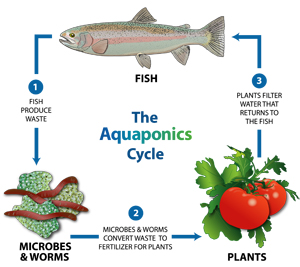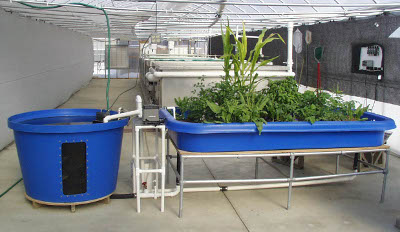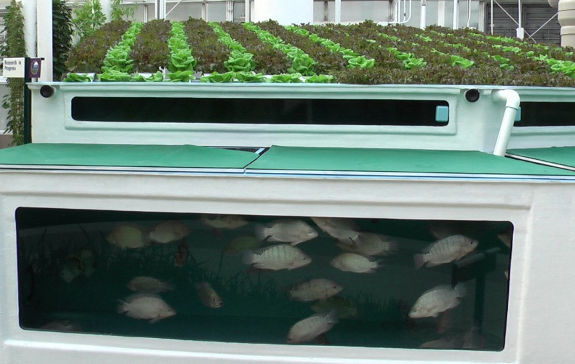
What is aquaponics?
So, what is
aquaponics? The gist is that you keep a tank of fish, circulating
their water through a plant grow bed to clean the water and feed the
plants.
 Although fish and plants are
what most people get excited about, an aquaponic system is actually
fuelled by a complex cycle including bacteria and worms. Fish
waste is full of ammonia, which is toxic to fish and which plants can't
use, but two types of bacteria convert that ammonia first to nitrites
(nitrosomona bacteria) and then into nitrates (nitrospira
bacteria). Plants love nitrates, so when you pump the fish-tank
water up to flow around your vegetables' roots, the plants quickly suck
up the nitrogen and return clean, aerated water to your fish.
Although fish and plants are
what most people get excited about, an aquaponic system is actually
fuelled by a complex cycle including bacteria and worms. Fish
waste is full of ammonia, which is toxic to fish and which plants can't
use, but two types of bacteria convert that ammonia first to nitrites
(nitrosomona bacteria) and then into nitrates (nitrospira
bacteria). Plants love nitrates, so when you pump the fish-tank
water up to flow around your vegetables' roots, the plants quickly suck
up the nitrogen and return clean, aerated water to your fish.
Meanwhile, compost worms in the plant grow bed are
cleaning up excess solids. Without these wrigglers, dead bits of
plant roots and larger particles of fish waste would build up  and require cleaning.
Luckily, compost worms can handle periodic inundations and do their
part to convert particulate matter into chemicals plants can easily
suck up.
and require cleaning.
Luckily, compost worms can handle periodic inundations and do their
part to convert particulate matter into chemicals plants can easily
suck up.
The fish, bacteria,
plants, and worms all work together to give each organism just the food
and environment it needs. I suspect this elegant, created
ecosystem is why aquaponics has won so many fans in permaculture
circles.
| This post is part of our Aquaponic Gardening lunchtime series.
Read all of the entries: |
Want more in-depth information? Browse through our books.
Or explore more posts by date or by subject.
About us: Anna Hess and Mark Hamilton spent over a decade living self-sufficiently in the mountains of Virginia before moving north to start over from scratch in the foothills of Ohio. They've experimented with permaculture, no-till gardening, trailersteading, home-based microbusinesses and much more, writing about their adventures in both blogs and books.
Want to be notified when new comments are posted on this page? Click on the RSS button after you add a comment to subscribe to the comment feed, or simply check the box beside "email replies to me" while writing your comment.


System a neighbor has that is very simple. She has a water tank, think watering trough, buried in the ground that she fills with water. Every spring after it's unfrozen she goes down to the pet store and buys a baggie of fish. Throughout the summer she scoops a 5 gallon pail out of the "pond" and adds another back. She does this every week or two. That's her "fertilizer water" she uses on her tomatoes etc.
She doesn't have the depth for over wintering fish but it does give her fertilizer for the garden for free and very near by. For someone without much access to transportation I thought it brilliant.
Rouse's, a New Orleans grocery chain is growing its produce with aquaponics. I listened to the story on NPR and it was fascinating.
http://ampsnola.com/content/rouses
I'm flippant about high-tech growing technologies. I don't even like potted plants much in my own gardening. I'm obsessed with soil and I want to see things growing out of the ground. Even so, it's interesting to hear what other people are doing.